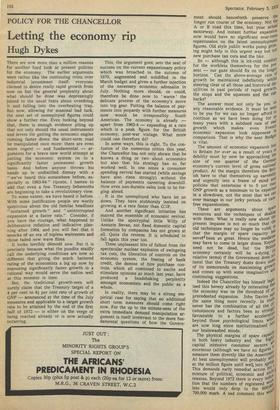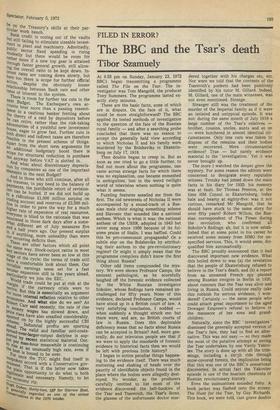POLICY FOR THE CHANCELLOR
Letting the economy rip
Hugh Dykes
There are now more than a million reasons for another hard look at present policies for the economy. The earlier arguments were rather like the continuing crisis over industrial investment itself: everyone claimed to desire really rapid growth from now on but the general perplexity about what should be done was depressingly joined to the usual fears about overdoing it and falling into the overheating trap. But now, allowing for seasonal bad luck, the next set of unemployed figures could show a further rise. Even looking beyond that, there is enough evidence piling up that not only should the usual instruments and levers for getting the economic engine running faster down the short-term road be manipulated once more: there are even more cogent — and fundamental — arguments for a brave new world attempt at putting the economic system on to a significantly faster permanent growth basis. And before anyone throws his hands up in undistilled dismay with a " we've heard this somewhere before, especially in 1963-64" riposte, I hasten to add that even a few Treasury behemoths are beginning to take a revolutionary view.
To some extent, we have heard it before. With some justification people are warily snspicious about the old familar headlines "sustained growth" and "uninterrupted expansion at a faster rate." Consider, if you have the courage, what happened to deliberative reflation and indicative planning after 1964, and you will feel that it smacks of an era of topless waitresses and those faded new wave films.
It looks terribly demode now. But it is precisely because what the pundits_ staidly call the underlying conditions are now so different that giving the much battered rating of the economists a leg up now by espousing significantly faster growth in a rational way would serve the nation well at this moment in time.
But, the traditional growth-men will surely claim that the Treasury target of a 4 per cent to 44 per cent rate of growth of GNP — announced at the time of the July measures and applicable to a target growth rate to be attained by the end of the first half of 1972 — is either on the verge of being reached already or is now actually occurring. This, the argument goes, sets the seal of success on the current expansionary policy which was broached in the autumn of 1970, augmented and solidified in the March budget and given a further injection of the necessary economic adrenalin in July. Nothing more should, or could, therefore be done now to ' waste ' the delicate process of the economy's move into top gear. Putting the balance of payments into jeopardy with further measures now would be irresponsibly South American. The economy is already — apart from 1963-4 — expanding at a rate which is a peak figure for the British economy, post-war vintage. What more could one therefore do?
In some ways, this is right. To the confusion of the numerous critics this year, the Chancellor has not only shown that he knows a thing or two about economics but also that his strategy has so far worked well. In one sense a consumer spending revival has started (while savings have also risen strongly) without the balance of payments careering downhill. Now even non-durable sales look to be forging ahead.
It is the unemployed who have let us down. They have stubbornly insisted on growing at a rate faster than GNP.
And another significant irritation has marred the ensemble of economic revival. Unlike the apocryphal little Willy of Aneurin Bevan, net fixed domestic capital formation by companies has not grown at all. Quite the reverse. It is scheduled to fall again this year too.
These unpleasant bits of fallout from the spectacular nuclear explosion of swingeing tax cuts, the liberation of controls on the economic system, the freeing of bank credit, the demise of hire purchase controls, which all combined to excite and stimulate opinions so much last year, have produced a headshaking perplexity amongst economists and the public as a whole.
In reality, there may be a strong empirical case for saying that no additional short term measures should come right now. For the up to the minute-ness of the extra immediate demand manipulation argument is itself irrelevant to the more fundamental questions of how the Govern ment should henceforth preserve the longer run course of the economy. Not the A or B road this time, but your actual motorway. And instant further expansioll now would have no significant near-term repercussion on the latest unemployment figures. Old style public works pump Prim: ing might help in this urgent way but n01 new purchase tax cuts and the like. So — although this is ice-cold comfort for the workless themselves for the Pre" sent — our gaze should fix on the longer, horizon. Can the above-average rate 01 growth be maintained indefinitely whilst steering clear of all those sad historical dis" utilities in past periods of rapid groWth, the stops and the squeezes and the cut' backs?
The answer must not only be yes, on any reasonable evidence. It must be seen to be yes for we can no longer afford te continue as we have been doing for se, many years with a subdued rate of real growth which makes even French economic expansion look nipponese comparison. That is why the next Budget is vital. The amount of economic expansion lostf to Britain for ever as a result of years e debility must by now be approaching the size of one quarter of the Gertnan, economy's current level of gross nations' product. At the margin therefore the Bri,t. ish have to chat themselves up earnest'Yo and urgently into a frame of mind an t policies that entertains 4 to 5 per cen, GNP growth as a minimum to be expecteu in a slowdown, not the most that we cati ever 'manage in our jerky periods of care free expansionism.
These are arguments about 5P, resources and the techniques of deal: with them. What is really new about the present impasse is not so much that th. old techniques may no longer be valid, a's that the margin of spare capacity 1°e nevef(been so great. Hence the rriediCin may have to come in larger doses. KeYri,,eil. need not be dead, but the Brit',.10 economy certainly will be a-dying relative terms) if the Government does insist that the Treasury dusts down of its memoranda on maximising gr°W„d and comes up with some imaginative 8' continuing suggestions. $1" Indeed the Chancellor has himself leguat ised this heresy already by reiterating the economy was on the threshold of no precedented expansion. John Davies 530. the same thing more recently. In trit;r, never has the combination of all the c'is, cumstances and factors been so strollt'i, favourable to a further accelerat1.0 beyond those psychological limits Wh,jto are now long since institutionalised In our brainwashed minds. The physical margins of spare capaehttlYy in both heavy industry and the hig"te capital intensive consumer sectors to enormous (although we have no figures5). measure them directly like the Americao,d; At best unemployment will probably at the million figure until well, into sPrl; This demands early remedial action fchiA1 mixture of political, economic and sA°.cca, reasons. Beyond 1972 there is every irwnio, tion that the numbers of registered Wn'op less would only drop to the 600,vd 700,000 mark. A sad comment this vi° be on the Treasury's skills at their particular work bench. Bank credit is oozing out of the vaults but still failing to stimulate sizeable invest ment in plant and machinery. Admittedly, Public sector fixed spending is rising Modestly but there would be room for rather more if a new top gear is attained through faster general growth, still allow ing the overall ratio to be kept down. Interest rates are coming down slowly, but here too there is scope for further official action, despite the obviously looser relationship between Bank rate and other rates of interest in the system. There is room for further tax cuts in the next Budget. The Exchequer's own ace0Unts bear more than a passing resemb lance to a cautious banker fretting about the theory of a raid by depositors before he can retire, rather than the risk-taking adventurism of a youthful new investment h°11se, eager to grow fast. Further cuts in both direct and indirect taxes are therefore feasible in the present scheme of things. Apart from the short term arguments for an additional budgetary boost there is scope for structural reduction in purchase tax anyway before VAT is slotted in. And what about discretionary depreciat1,°1113Y companies as one of the important elements in the next Budget? And to those who still continue, after all the traumas, to pay heed to the balance of
1
PaYments, the justifiable retort of revisionCan be hurled. If we did not build up t'0 a ridiculous £1,000 million surplus on rading account and reserves of £2,500 mil1,1°. n in order to pave the way for a much nigher rate of expansion of real resources, everyone is blind to the rationale that was enuciated in those dark days after a someant different set of July measures five is nd.fa half years ago. Our present surplus , anything, more unhealthy than were our recurring deficits then. the are other factors which all point same way. Stock-output ratios in most eY sectors have never been so low at this hstage of the cycle: the terms of trade still ir,v.e. a comfortable look about them. Our s.sIble earnings seem set for a fast ecular expansion still in the years ahead, Particularly we join the EEC. Marorld trade could be put at -risk at the • -"if the currency crisis were to f-,ve. But this is essentially an argument e'ir More internal reflation relative to other obert e0 ore And what else do we see? As in Carr said recently, the rate of rise pri eY wages has slowed down, and s Puce rises have also steadied considerably, sPehurred on by the highly successful CBI ah.,en2e. Industrial profits are spurting The valid and familiar unit-costsp'e'rt'ad-over-larger-output doctrine is suppui`e,sci bY recent statistical material. OutXer Man-hour meanwhile is continuing the–kse at an unusually high rate, even if p USt is bound to be over. uns clr once the TUC might find itself in ernrnPGken accord with a Conservative govtheib• That is if the latter now takes °." oPportunity to do what is both the and necessary. Namely, to let e ecO°0My rip.
,,LsgenerZs' thirty-two, MP for Harrow East, ortserv Y regarded as one of the ablest Y regarded as one of the ablest Y regarded as one of the ablest L atives in the 1970 intake.











































 Previous page
Previous page